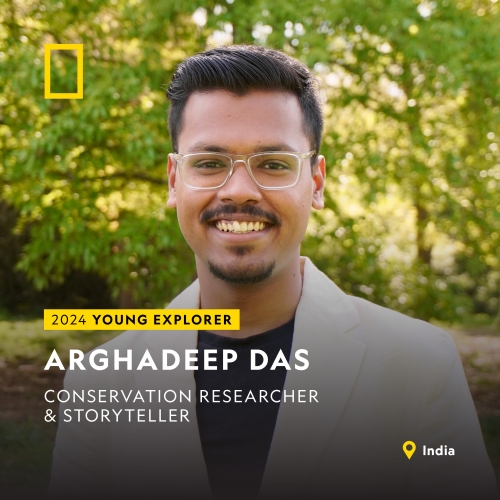
What did you study before coming to Geneva and how did you first get involved with National Geographic?
Taking a U-turn from business and commerce, which I studied in high school, I decided to pursue my undergraduate studies in geography at the University of Delhi, fueled by my passion for understanding human-environment interactions. Geography allowed me to connect with natural landscapes in their pristine forms - through fieldwork and excursions, thus forming the cornerstone of my interest in environmental education and youth advocacy for sustainability. After graduating college, I pursued a post-graduate diploma in environmental law and policy diploma from National Law University - Delhi and WWF-India. The combination of geography and environmental law and policy equipped me with unique skills and knowledge to define a strong career in environmental policymaking and advocacy. Subsequently, in 2021, I was selected for the first cohort of the National Geographic Society and The Nature Conservancy’s Marine and Community Conservation Externship to spotlight local conservation challenges. This was the pivot in my career that led me to biodiversity and nature conservation.
Tell us about your work in the Bengal Sundarbans.
My work in the Bengal Sundarbans started thanks to the Marine and Community Conservation Externship. As part of the externship, I developed an impact communication and storytelling project focused on the degradation of Bengal Sundarbans. By weaving stories of local fishermen and their lived realities with scientific research on the mangrove landscape, I created a compelling narrative that argued the need for a more intricate understanding of the multi-faceted problems in the region. It was my first time working with tools such as storytelling and communication for social impact, which allowed me to be creative and play beyond the traditional story arcs and narratives. This experience instilled in me not just a fundamental appreciation for storytelling and audiovisual methods but also allowed me to nurture my brainchild project on Bengal Sundarbans - which I eagerly hope to dive deeper into throughout my explorer journey.
How did your externship working in the Bengal Sundarbans impact the path you took in its aftermath?
Looking back, I do wonder about the path my career might have followed if I had not applied for and been chosen for the externship. In the fall of 2021, I was set to start an MSc at the University of Oxford. However, due to funding constraints and exigent circumstances at the time, I decided to forgo my Oxford education. It was during this same time that I came across the externship. I decided to give it a shot. It turned out to be one of the best decisions in my life. The externship allowed me to put a foot in the conservation world and explore things I had always heard conservationists and researchers discuss. It fascinated me – to the point that I jumped into focusing on the world’s largest mangrove ecosystem - the Sundarbans, its gradually deteriorating character, and what it meant for the local communities who called it their home for centuries. By immersing myself in the local setting and treading through narratives, I realised the fragility of the communities at the frontlines of environmental degradation - without adequate support and protection to brave these issues. Experiencing these first-hand enabled me to not only empathise with the community but also strengthen my resolve to help tackle these issues through storytelling and policymaking.
What brought you to the Geneva Graduate Institute and how do your studies complement your conservation efforts?
Having been passionate about policymaking and environmental governance, the Geneva Graduate Institute emerged as a superior pathway to expand my knowledge in international affairs and developmental studies. It has been over six months since I have been at the Institute, and I already see the perceptive change in the way I think critically and visualise global challenges. I am particularly thrilled about the courses I am taking, including Environmental Justice and The Anthropology of Climate Change, led by distinguished professors, which not only complement my conservation efforts but also allow me to think critically and question the underlying constituents perpetuating larger issues.
What does it mean to be named a National Geographic Young Explorer, and what do you hope it will bring to your projects?
It is a truly surreal and humbling experience. Being named a National Geographic Young Explorer is a profound honour that fills me with tremendous hope and optimism to continue amplifying local voices in fragile environments, seeking solutions to critical challenges, and helping preserve sensitive ecosystems for future generations. This recognition is more than just an award—it is a privilege, responsibility and generous offering of our promise to the world to work together for a better future. With this renewed sense of purpose and support from National Geographic, I am determined to go into the world and create a more tangible impact in our community, especially for the voiceless and most vulnerable.


